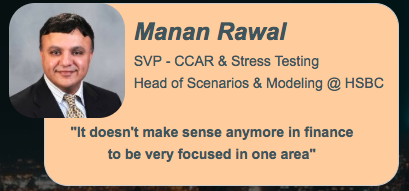1. Expand your focus and expect change.
NYIF: When you first entered the financial industry, did you have a clear idea of what you wanted to do and how your career would progress?
Manan: Not really, when I first entered the field, I had a very open mind regarding what profession I wanted to be involved in. I started on the consulting side, then went back to grad school and rejoined the financial markets in a totally different capacity. A big reason for the different areas of focus in my career is what has happened to the financial markets over the past twenty years… Dramatic globalization of the markets, dramatic change in focus… Banking isn’t what it used to be five years ago, and there are other elements to the marketplace now such as alternative investment vehicles, hedge funds, and larger asset management institutions. A lot of different players have come in and guided significant changes in the structure of the markets.
For that reason, it doesn’t make sense anymore in finance to be very focused in one area. Things tend to change and be fluid, so you have to make sure you structure your career based on that premise.


2. Consider alternatives to graduate degrees.
NYIF: How do you feel about formal education and graduate studies as a way of growing in a career?
Manan: You have to be very careful when committing to a graduate study program these days, particularly in finance and corporate America. When you have so much rapid change to an industry and its traditional practices, the value of a graduate degree can be diminished. 5-10 years ago it was less of a calculation, but now you may not get that immediate salary bump or that new job. Graduate studies can help in some situations, but you have to be very careful, particularly if it’s a full-time program where you’re not earning a salary. The recovery path may be much longer than what you thought!
As an alternative to graduate degrees, professionals should consider enhancing their careers by adding in additional study, whether it be through specialized programs, not necessarily full degrees, or even something informal online like a MOOC.
3. Company politics matter less in the long run.
NYIF: In terms of career advancement, how much do company politics matter in the modern financial industry?
Manan: Being brutally honest, politics are definitely a factor that come into play. In any organization that’s even modest in size, corporate organization and culture can result in the candidate with the longer tenure or an ‘inside track’ getting a leadership role, as opposed to the candidate with the complete skill set. The only thing I would say is that in the long run, these types of political constraints will face market pressures. What I mean by that is over time you will get changes in corporate structure, particularly if the industry is relatively mature and has lots of competition, that will diminish the impact of politics. What I’ve seen from other companies is that the internal situation does evolve, and the change can be dictated totally externally, by regulation or some other outside factor.For that reason, it doesn’t make sense anymore in finance to be very focused in one area. Things tend to change and be fluid, so you have to make sure you structure your career based on that premise.


4. Pursue your passions
NYIF: If you could offer one piece of advice to financial professionals looking to grow in their careers, what would be?
Manan: Don’t worry so much about defining a career path very early on. Build your skill set and pursue things that don’t seem relevant to your industry at face value. Your passions may be very relevant down the line in terms of your thinking and management skills. Whether it’s art, science, whatever floats your boat, pursue it with full vigor even if you have to do it part time. Don’t give up on your passions, because ultimately, they will lead to a unique skill set and way of thinking that you may not have the opportunity to develop later on.

Interested in Risk Management?
Check out the Risk Management Professional Certificate from the New York Institute of Finance
*With our early booking rate, reserve your seat at least 3 months in advance and enjoy 10% off any in-course of your choice. For even greater savings – book 6 months out and enjoy 20% off.

